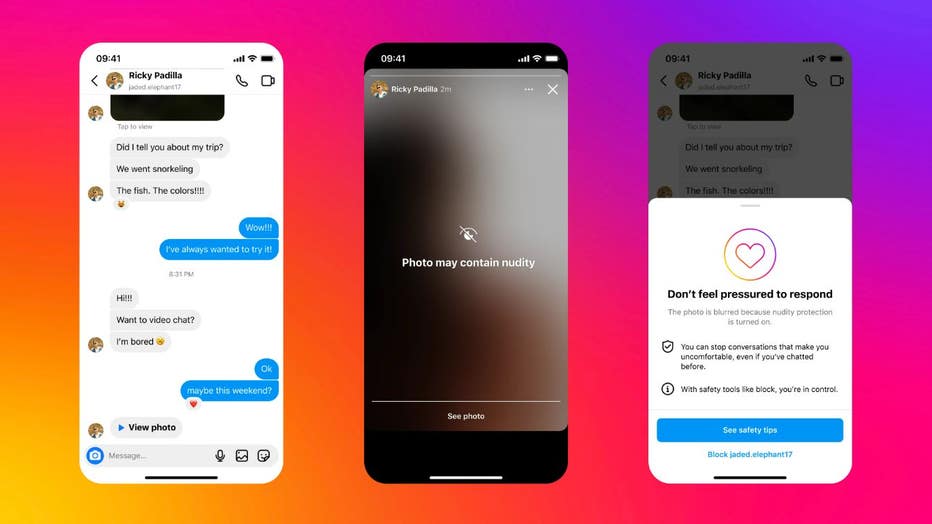Instagram is cracking down on teen sextortion – here's what that means
FILE - A woman looks at a iPhone screen on January 26, 2024, in Bath, England. (Photo by Matt Cardy/Getty Images)
Instagram on Thursday announced new tools aimed to protect young people on the app and combat sexual extortion – or "sextortion" – including a feature that will automatically blur nudity in direct messages.
Sextortion involves persuading a person to send explicit photos online, and then threatening to make those images public unless the victim pays money or engages in sexual favors.
In a blog post, Instagram said it's testing out the new features as part of its campaign to fight sexual scams and other forms of "image abuse," and to make it tougher for criminals to contact teens.
Recent high-profile cases include two Nigerian brothers who pleaded guilty to sexually extorting teen boys and young men in Michigan, including one who took his own life, and a Virginia sheriff’s deputy who sexually extorted and kidnapped a 15-year-old girl.
Social media companies like Instagram have faced growing criticism for not doing enough to protect young people on these apps. Mark Zuckerberg, the CEO of Facebook and Instagram parent company Meta, apologized to the parents of victims of such abuse during a Senate hearing earlier this year.
Teen’s death leads FBI to online sextortion scheme
In 2022, Jordan DeMay, 17, killed himself after an online chat turned to demands that he pay money to keep intimate photos secret. He was one of dozens of people targeted online by two men extradited from Nigeria to face charges, according to FBI director Christopher Wray.
The arrests came after the FBI joined with police in Michigan to investigate the death of DeMay, one of thousands of American teenagers targeted in a sharp rise in online "sextortion" cases in recent years.
In the scheme, three men were part of a ring that stalked users on social media and would hack accounts to harass and intimidate victims into paying money, according to the indictment.
As part of the scheme, someone hacked social media accounts and then sold the hacked accounts to the two Nigerian brothers charged. In turn, the men posed as young women and girls to lure teenage and young adult men to engage in sexual chats, authorities said.
They would initiate the conversation with the victims while simultaneously researching them online – including information about where they lived, went to school, and worked, according to the indictment. Once they gained their trust, they solicited the victims to make and send sexually explicit images of themselves.
Once received, they would create a collage of pictures that showed the sexually explicit image and others of the victim from social media, including photos of their friends and family. Then they threatened to send the collages to the victim's followers unless they agreed to pay money, according to the indictment.
When DeMay could not pay, the person on the other end pushed the teenager to kill himself, authorities said.
Instagram’s new tools to combat sextortion

Instagram’s new tools are pictured in provided images. (Credit: Instagram)
In its blog post, Instagram said scammers like this often use direct messages to ask for "intimate images."
To counter this, the platform will soon start testing out a nudity protection feature for direct messages that blurs any images with nudity "and encourages people to think twice before sending nude images."
"The feature is designed not only to protect people from seeing unwanted nudity in their DMs, but also to protect them from scammers who may send nude images to trick people into sending their own images in return," Instagram said.
The feature will be turned on by default globally for teens under 18. Adult users will get a notification encouraging them to activate it.
Images with nudity will be blurred with a warning, giving users the option to view it. They'll also get an option to block the sender and report the chat.
For people sending direct messages with nudity, they will get a message reminding them to be cautious when sending "sensitive photos." They'll also be informed that they can unsend the photos if they change their mind, but that there's a chance others may have already seen them.
Instagram said it's working on technology to help identify accounts that could potentially be engaging in sexual extortion scams, "based on a range of signals that could indicate sextortion behavior."
To stop criminals from connecting with young people, it's also taking measures including not showing the "message" button on a teen’s profile to potential sextortion accounts, even if they already follow each other, and testing new ways to hide teens from these accounts.
The Associated Press and FOX 2 Detroit contributed to this report.

